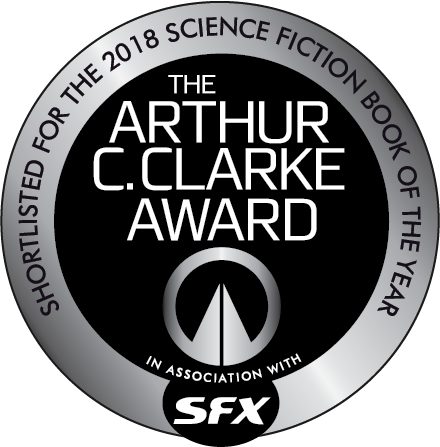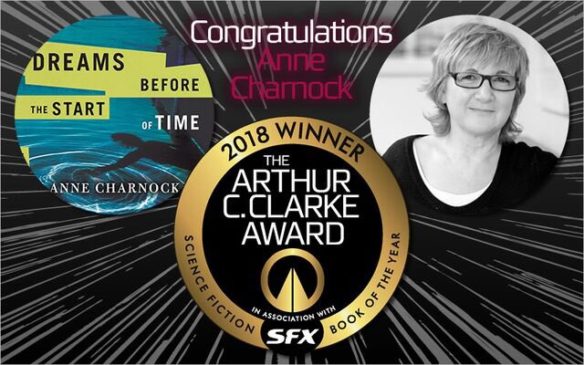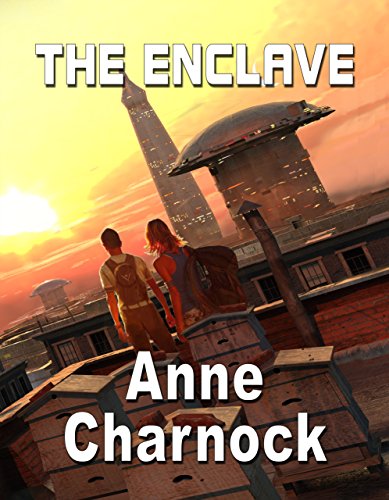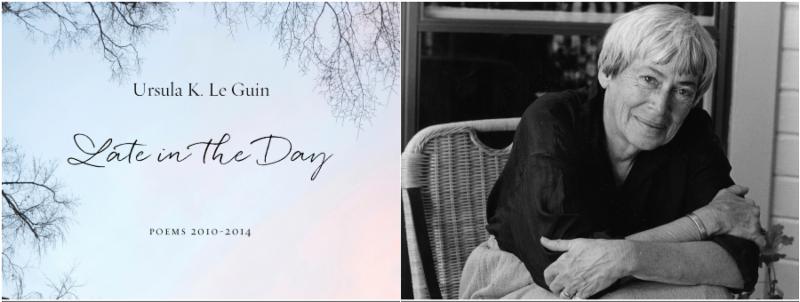(1) MAGAZINE WITHDRAWS COVER AFTER LEARNING IT WAS PART AI-GENERATED. [Item by Edmund Schluessel.] Factor Four Magazine has published the following statement and apology about Issue 18:
Yesterday it was brought to my attention that the cover of Issue 18 may have been AI generated artwork. I launched an immediate investigation and discovered that it was, at least partially, AI generated. I have removed the artwork from our website and replaced it with a filler image.
Factor Four Magazine values human artists and deeply regrets that this happened. While I unknowingly bought and displayed AI art as a cover, I still take full responsibility for this.
I have used a website to purchase artwork for magazine covers, that despite saying they don’t accept AI work, it is clear that not only do they accept it, they will not remove AI art if it is discovered. As a result I will no longer be doing business with them.
It will take some time, but I will be looking over all art work purchased through this company to ensure, as best as I can, that it is human artwork. Furthermore, I will be looking at stock images I have used both here and on my own website to ensure no AI is used.
Unfortunately there is no fool proof way to detect AI artwork, so we appreciate the person coming forward so that we could correct this. I apologize on behalf of Factor Four Magazine – Richard
(2) WHO COULD ASK FOR ANYTHING MORE? “First ‘Star Trek’ Musical Announced, Trailer Revealed” and The Hollywood Reporter
Paramount+ confirmed rumors of a musical Star Trek episode with the release of a surprise trailer (below) for an upcoming episode of Strange New Worlds season two. The episode is titled “Subspace Rhapsody,” and it’s billed as the first-ever musical-themed episode in the franchise’s 57-year history (there have previously been musical scenes). “Subspace Rhapsody” will feature 10 original songs, plus a musical version of the series’ main title, with music and lyrics by Kay Hanley (Letters to Cleo) and Tom Polce (Crazy Ex-Girlfriend)….
(3) PEMMI-CON. Mooseletter #4 lists the winners of the Masquerade Awards and Art Show Awards. There are some photos of the top masquerade entries (or so I assume – there are no captions.)
(4) PORTRAIT PHOTOS OF SFF CREATORS. Hugo-nominated photographer Richard Man has added his submission to the Hugo Voter Packet to his “Worldbuilders of Science Fiction and Fantasy” gallery. The direct link is here.
July 23, 2023 update: nominated by members of previous year and current year’s worldcons and voted on by the members of the current year’s worldcon, the Hugo Awards are science fiction’s most prestigious award. I am very honored to be a finalist in the “Best Fan Artist” category in the 2023 Hugo Awards. My work is eligible for the award mainly due to exhibitions on-site and online of this project. Grateful thanks to everyone who has participated in or supported my project!
(5) TAKE AN AX TO IT. Katharine Kit Kerr shared with Facebook readers that rising paper costs will have this effect:
Depressing news from ComicCon via my agent. Publishers here are now worrying about the cost of paper. Apparently the cost has gone so high that they don’t want any books longer than 110K. Does the story need more? Tough. Are there elements that don’t “advance the plot” but are important in other ways. Tough. Cut’em out.
I don’t know if this applies to literary fiction, too. But definitely to genre.
(6) WHY THIS SPSFC JUDGE WON’T BE BACK. Alex Hormann, a judge in the recent Self-Published Science Fiction Competition, bids “A Farewell to the SPSFC” on At Boundary’s Edge.
The State of Self-Published Science Fiction
Look around book blogs, and you’ll see hundreds of self-published books being reviewed. The SPFBO fills up within hours every year. For the inaugural SPSFC, we had a little over the desired 300 submissions. For SPSFC2, we hit a little over half that before flatlining. Either the books weren’t there, or the authors did not want to submit, perhaps being unaware of the contest. For that reason, books eliminated in the first year’s slushpile were made eligible for a second chance this year. This helped those books that ran into tough competition and poor book-judge matches the year before, but also meant that the books eliminated early on in the first year were now back to trouble us again. To me, this exposed one clear fact. The overwhelming majority of slushpile books were terrible….
Who Is The SPSFC For?
…One thing I have noticed in both years of the competition is that the conversation surrounding the SPSFC almost entirely consists of bloggers an authors. I remain unconvinced that the competition has had an impact on readers. Initially, yes, there was a great deal of excitement. But from my own blog statistics, I can easily tell that excitement has tailed off. Few of this year’s posts reached even half of the views of the previous year’s equivalent. As a blogger, I want to get views. The SPSFC brings those, but the interaction comes from authors and bloggers, rarely from disinterested readers….
Why I’m Bowing Out
…Then there are the structural issues within the contest itself. The first year, it seemed as though Hugh Howey and Duncan Swan would be running the show. To his credit, Swan has done marvellous work, though real life has kept him distracted. As to Howey, very little can be said. Clearly, he too is busy, not least with the monstrous success of the Silo TV series. And yet his actions still have an impact on the contest he founded. Because of Howey, we became embroiled in the heated AI art debate, which is a mess on every side. Not having any clear hierarchy of command within the contest makes it all but impossible to achieve anything. This year we went through most of the finals without any coherent gathering of team scores….
A former judge myself, I left a comment there agreeing with much that Hormann said.
I left after the first year for reasons comparable to yours. A large portion of the entries are not very good. Hugh Howey does practically nothing despite having founded the contest, which is an important reason no one knows it is going on.
Another problem is the incessant tinkering with the structure of the contest. The Discord is like a Worldcon business meeting permanently in session. That on top of an already stressful reviewing workload was ridiculous.
(7) THEY’RE PINK. TrekMovie contributes its own genius Barbie mashup here.
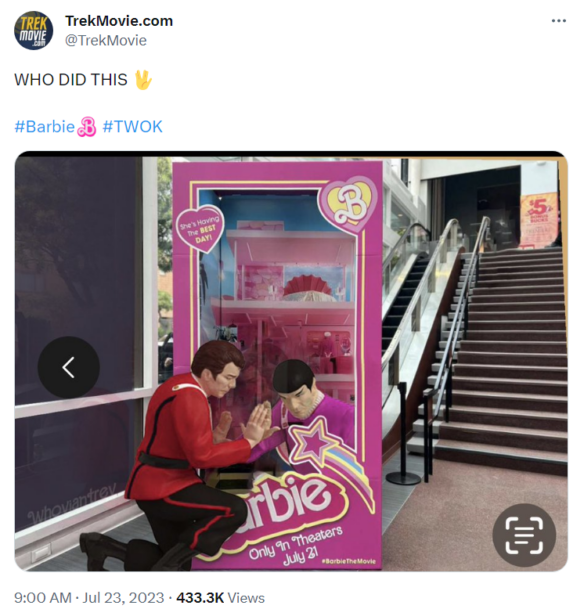
And an artist needs to catch up with another Twitter user’s wish list: “I need a Han Solo in barbienite.”
(8) MUSIC OF THE SPHERES. ClassicalMusic.com picks “The best recordings of Holst’s The Planets”. (Remember that Valentine Michael Smith, in Stranger in a Strange Land, resorts to the symphony’s Mars movement when called on for the equivalent of a national anthem.)
Although The Planets, composed 1914-16, opened new avenues in Holst’s treatment of tonality and structure, it did not represent an entirely new chapter in his creativity. Rather, it crystallised much of his thinking, both in terms of musical potential and in his understanding of the human condition.
Looking at The Planets through the context of what he had previously composed, and what came after, helps us to understand not only one of the most loved works in the modern orchestral repertoire, but also the extraordinary creative mind behind it. Join us now on this journey, as we visit each planet in turn, and recommend their finest recordings…
(9) OVERDUE. Here’s a quest – find physical books that once belonged to poet John Milton: “‘To be still searching what we know not, by what we know’: Recovering the Lost Library of John Milton” from the Center for Material Texts at Cambridge University.
… I was given free rein to think about how I might approach the tracking down of the rest of Milton’s library in the short timeframe of eight weeks; a daunting task, given the wealth of scholarship on this topic by scholars such as William Poole, let alone the number of books that must have passed through Milton’s library during his lifetime.[1] Only nine volumes have been identified as belonging to Milton; many others have since been disputed or dismissed as spurious.[2] While it is not the place of this blogpost to rehearse the numerous scholarly conjectures on the immediate journey of Milton’s library following his death, it is suffice to observe that, as Scott-Warren and Bourne’s discovery has shown, there is no easy way to predict where Milton’s books may have ended up.[3]…
(10) MEMORY LANE.
2017 – [Written by Cat Eldridge from a choice by Mike Glyer.]
Anne Charnock is not a writer that I’ve ever heard of but her novels sound fascinating.
Five years ago, she’d win the Arthur C. Clarke Award in science fiction, for her Dreams Before the Start of Time novel which is where our Beginning comes from.
She has an extremely short genre career consisting of two novels before this one, A Calculated Life which was self-published and Sleeping Embers of an Ordinary Mind, and one after, Bridge 108.
For stories, she had but four, “The Enclave” (a BSFA winner), “A Good Citizen”, “A Cure for Homesickness” and “All I Asked For”. Her genre writing career ended five years ago.
Our novel garnered a Clarke Award and was nominated for a BSFA.
Here’s our Beginning…
Year 2034
The Apple Tree
August
This year’s crop of apples is so poor that Betty Matheson counts the overnight windfalls when she opens her bedroom shutters each morning. Today, she looks down on the gravel path and sees a split apple at exactly the point where she expected to see one; she heard the crunch of that singular windfall just after dawn. As a rule, she collects the apples, or apple, before breakfast. That is, before too much damage is inflicted by stabbing blackbirds and burrowing wasps.
In years gone by, the tree was so burdened that apples thumped down on the lawn throughout the night. Back then, she discarded any split apples, any apples with a bruise, and all the small apples that, she convinced herself, were too fiddly to peel. When she’d filled her two-handled blue bucket with near-flawless windfalls, she felt she’d met her responsibility to the tree. The rest had to go.
She wonders how such a perfectly shaped and healthy apple tree could have caused her so much stress. Whenever she went away from home, she implored neighbours to collect the windfalls. “Or take whatever you can reach on the tree.” She felt embarrassed, offering apples from the bough after offering the windfalls. But surely it made sense to everyone to take the windfalls first.
As it happened, most of her neighbours had their own apple trees, so Betty inevitably returned home to a war zone of fallen apples—cracked and speckled brown with fungal eruptions. She can’t erase the memory—the scars and the rotting.
These years most of the apples are small, and there’s no surplus. Five small red apples hang high in the tree’s crown, too high for Betty to reach even at a stretch from a ladder. She hopes they’ll have a soft landing.
Nothing is as it should be. Her husband dead, despite being five years her junior. That wasn’t supposed to happen. She never imagined herself as the one left behind. And Aiden, her son, so loving. So loving, but… “Damn it, Aiden,” she says through her teeth. She imagines herself placing her arms around the trunk of the apple tree. Her caress morphs into a bear hug. She tears the tree from the ground, roots and all, and she thrashes the canopy against the ground.
(11) TODAY’S BIRTHDAYS.
[Compiled by Cat Eldridge.]
- Born July 23, 1888 — Raymond Chandler. He of the hard-boiled detective genre is listed by ISFDB as doing some stories of a genre nature, to be exact ”The Bronze Door”, “The King In Yellow”, “Professor Bingo’s Snuff” and “English Summer: A Gothic Romance”. I’ve not read these. So who here has? “The King In Yellow” is in the Raymond Chandler megapack. (Died 1959.)
- Born July 23, 1914 — Virgil Finlay. Castle of Frankenstein calls him “part of the pulp magazine history … one of the foremost contributors of original and imaginative art work for the most memorable science fiction and fantasy publications of our time.” His best-known covers are for Amazing Stories and Weird Tales. “Roads,” a novella by Seabury Quinn, published in the January 1938 Weird Tales, and featuring a cover and interior illustrations by him, was originally published in extremely limited numbers by Arkham House in 1948. It’s available at usual suspects. (Died 1971.)
- Born July 23, 1926 — Eunice Sudak, 97. Novelizer of three early Sixties Roger Corman films: Tales of Terror, The Raven and X, the latter based of The Man with the X-Ray Eyes. She wrote a lot of other novelizations but they weren’t even genre adjacent.
- Born July 23, 1943 — Kathryn Powers, 80. Her list of works as screenwriter is quite impressive — Airwolf, Deep Space Nine, Fantasy Island, Fantastic Journey, Kung Fu, Logan’s Run, Next Generation, Stargate SG-1, Swamp Thing and Wonder Woman. She is now retired, and spends most of her time researching metaphysics.
- Born July 23, 1947 — Gardner Dozois. He was the editor of The Year’s Best Science Fiction anthologies and was editor of Asimov’s Science Fiction for twenty years, getting multiple Hugo and Locus Awards for those works. His writing won the Nebula Award for Best Short Story twice, once for “The Peacemaker”, and again for “Morning Child”. Being Gardner Dozois: An Interview by Michael Swanwick covers everything he wrote to that date. (Died 2018.)
- Born July 23, 1956 — Kate Thompson, 67. Author of the New Policeman trilogy which I highly recommend. Though written for children, you’ll find it quite readable. And her Down Among the Gods is a unique take on a Greek myths made intimate.
(12) APPLYING TO THE FOUNDATION. The Sunday Morning Transport has posted a free read to encourage subscriptions. Sara Ryan’s “Re: Request For Prophecies And Quest Funding Application Guidelines” is a kind of fantasy-world grant application.
…Transcriptions or recordings of oracular pronouncements pertinent to the Quest. The Foundation is solely interested in pronouncements from prominent and well-respected oracles, such as those providing forecasts to monarchs, commanders, pontiffs, and other widely recognized leaders. Pronouncements from community-based scryers and soothsayers are not acceptable.
Come on, Bob, you have to know this one’s just a racket. All the Foundation-approved oracles charge too much. And their pronouncements are so vague! It doesn’t matter what happens; they’re gonna say it was foretold….
(13) TOASTMASTERS WITH A SFF THEME. The next Worlds of Wonder Toastmasters online event on July 29 has a ‘Steampunk Fiction’ theme. Follow it at the link.
Worlds of Wonder Toastmasters club uses science fiction and fantasy topics to help members develop their public speaking and leadership skills in a friendly environment.
Please consider visiting the club at any of its regular meetings at the same time every Saturday. We hope to see you soon!
(14) THE ACME OF EDUCATION. “Tiny Toons Looniversity Reveals Revamped Theme at Comic-Con” reports Comicbook.com.
The Tiny Toons are back in action with a brand new series that will pay homage to the original Tiny Toons while also bringing some fresh energy to the mix. The new series is titled Tiny Toons Looniversity, and during the Tiny Toons Looniversity SDCC panel, WB revealed the official theme song and opening theme for the show. The new theme song is from composer Matthew Janszen, and as you can watch and hear in the theme below, the heart of the Bruce Broughton classic from Tiny Toon Adventures is alive and well. The new series will hit Cartoon Network and Max late this fall.
Tiny Toons Looniversity delivers a modern remix of the beloved original series in half-hour animated form and is developed by Amblin Television in association with Bros. Animation. Fan favorites like Buster, Babs, and Hampton all make a return…
(15) MOVIES FROM AN ALTERNATE PAST. [Item by Daniel Dern.] Lord of the Rings by Akira Kurosawa: (LOTR as a Japanese samurai fantasy film)
Star Wars as a Retro Sci-Fi 50s Film
Space Invaders (1920) | Fritz Lang Style
(16) HIGHLY RECOMMENDED DISASTERS. [Item by Jeffrey Smith.] A good, well-written list of nuclear disaster films, including mention of the BBC mini-series on Oppenheimer that was discussed here earlier this week. One typo I caught was calling the co-writer of Testament John Sacred Young. I saw his actual name, John Sacret Young, many many times on two of my favorite TV series, China Beach and The West Wing. “Happy end of the world: Top 15 Anti-Nuke Films” at Digby’s Hullabaloo.
… In consideration of those recent events (and this being the opening weekend for one of the most hyped summer movies in recent memory, Christopher Nolan’s biopic Oppenheimer-which I have not seen yet) I thought I’d share my picks for the top 15 cautionary films to watch before we all go together (when we go). Uh…enjoy?…
(17) HEAVY ON THE SCALES. Earlier this year MindQ did a roundup of “10 Upcoming Kaiju Movies In 2023-2024”.
[Thanks to Chris Barkley, Michael Toman, Cat Eldridge, Daniel Dern, Edmund Schluessel, Jeffrey Smith, SF Concatenation’s Jonathan Cowie, Mike Kennedy, Andrew Porter, John King Tarpinian for some of these stories. Title credit belongs to File 770 contributing editor of the day Ken Richards.]

